外研版(2019)选择性必修 第二册Unit 6 Survival Understanding ideas课件(共15张PPT,内镶嵌视频素材)
文档属性
| 名称 | 外研版(2019)选择性必修 第二册Unit 6 Survival Understanding ideas课件(共15张PPT,内镶嵌视频素材) | 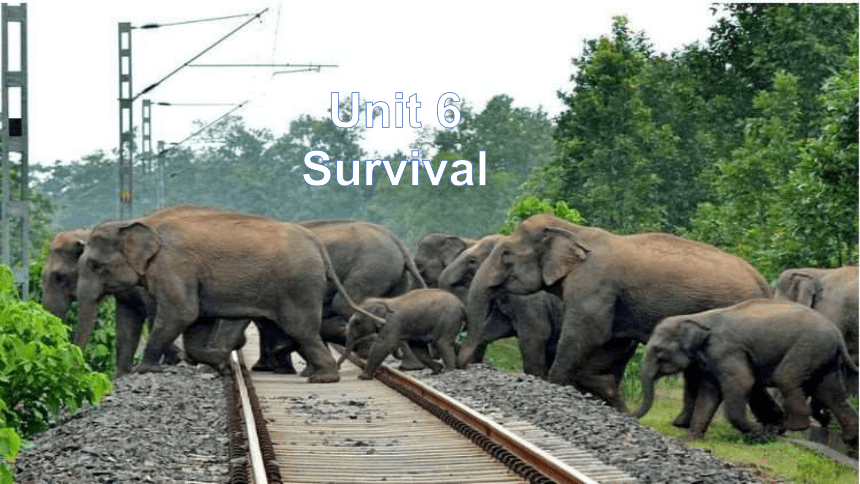 | |
| 格式 | pptx | ||
| 文件大小 | 44.8MB | ||
| 资源类型 | 教案 | ||
| 版本资源 | 外研版(2019) | ||
| 科目 | 英语 | ||
| 更新时间 | 2023-03-04 13:01:58 | ||
图片预览

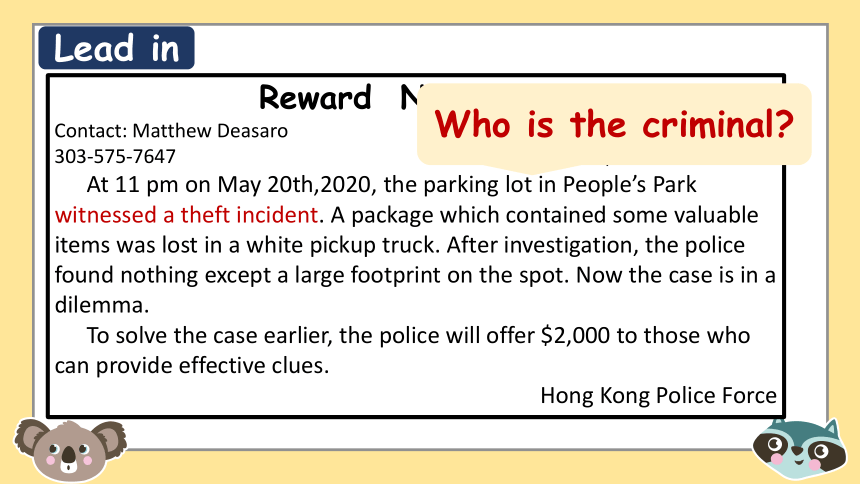
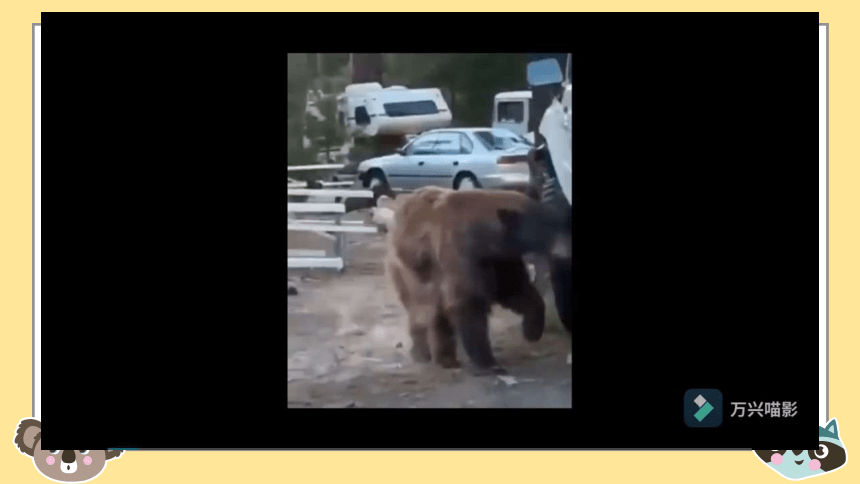
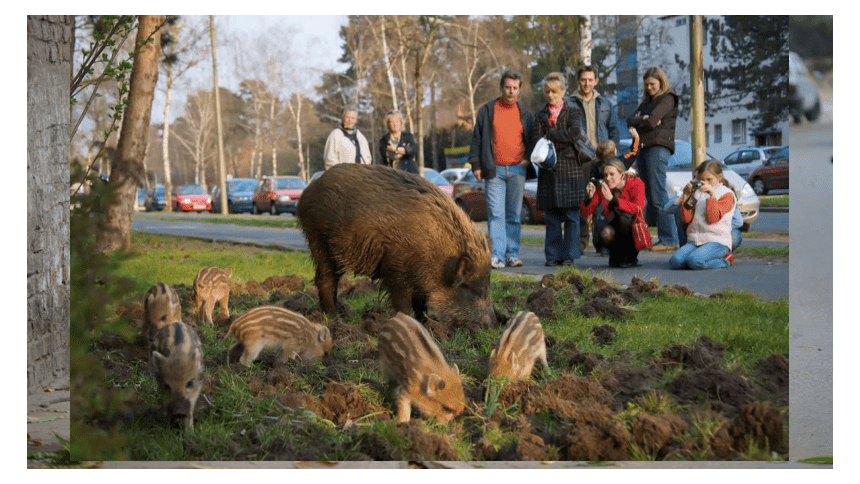
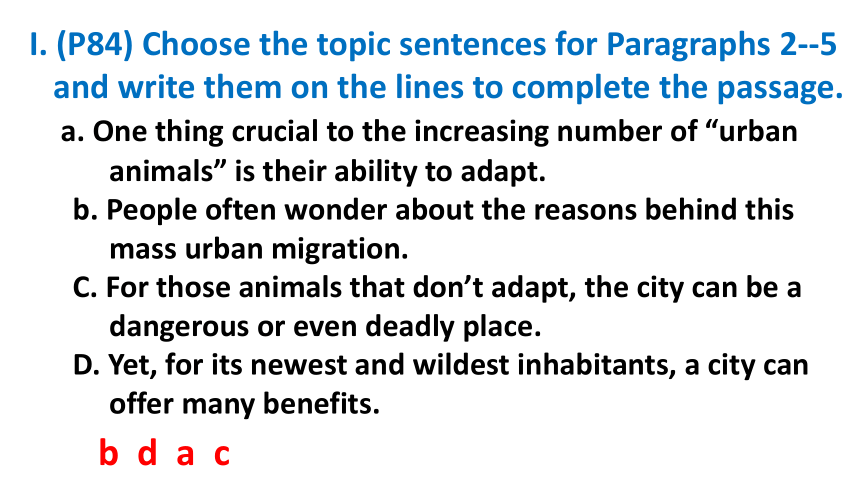
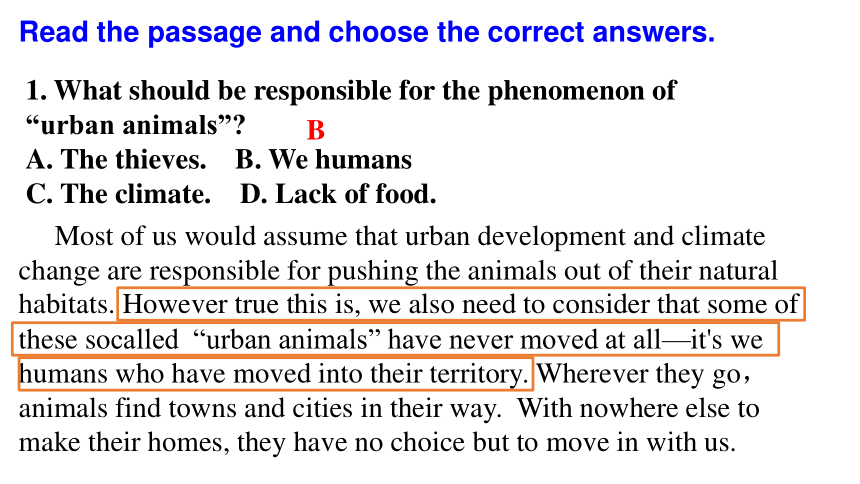
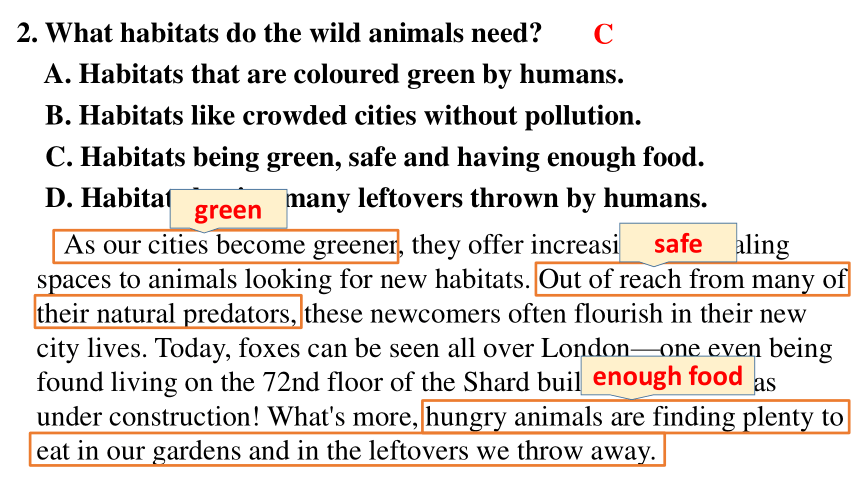
文档简介
(共15张PPT)
Unit 6
Survival
Lead in
Reward Notice
Contact: Matthew Deasaro For immediate Release
303-575-7647 Thursday, March 4, 2021
At 11 pm on May 20th,2020, the parking lot in People’s Park witnessed a theft incident. A package which contained some valuable items was lost in a white pickup truck. After investigation, the police found nothing except a large footprint on the spot. Now the case is in a dilemma.
To solve the case earlier, the police will offer $2,000 to those who can provide effective clues.
Hong Kong Police Force
Who is the criminal
This was no ordinary criminal: it was a bear.
I. (P84) Choose the topic sentences for Paragraphs 2--5
and write them on the lines to complete the passage.
a. One thing crucial to the increasing number of “urban
animals” is their ability to adapt.
b. People often wonder about the reasons behind this
mass urban migration.
C. For those animals that don’t adapt, the city can be a
dangerous or even deadly place.
D. Yet, for its newest and wildest inhabitants, a city can
offer many benefits.
b d a c
1. What should be responsible for the phenomenon of
“urban animals”
A. The thieves. B. We humans
C. The climate. D. Lack of food.
Read the passage and choose the correct answers.
B
Most of us would assume that urban development and climate change are responsible for pushing the animals out of their natural habitats. However true this is, we also need to consider that some of these so called “urban animals” have never moved at all—it's we humans who have moved into their territory. Wherever they go, animals find towns and cities in their way. With nowhere else to make their homes, they have no choice but to move in with us.
2. What habitats do the wild animals need
A. Habitats that are coloured green by humans.
B. Habitats like crowded cities without pollution.
C. Habitats being green, safe and having enough food.
D. Habitats having many leftovers thrown by humans.
C
As our cities become greener, they offer increasingly appealing spaces to animals looking for new habitats. Out of reach from many of their natural predators, these newcomers often flourish in their new city lives. Today, foxes can be seen all over London—one even being found living on the 72nd floor of the Shard building when it was under construction! What's more, hungry animals are finding plenty to eat in our gardens and in the leftovers we throw away.
green
safe
enough food
3. Why urban animals are more intelligent than wild animals
A. Because there are more tasty food in cities.
B. Because they have to solve difficult problems.
C. Because they have to find new homes.
D. Because there are more humans.
B
There is evidence that urban racoons are more intelligent than their wild cousins, as they frequently have to figure out difficult problems such as how to open rubbish bins and other containers which they would not find in the wild. Some animals have even changed their living habits to fit in with their new homes. Although naturally active at night, urban foxes come out in daylight if the reward is good enough.Their city location also means that they are getting a taste for the multicultural cuisine on offer from the garbage, such as hamburgers, lamb kebabs and even garlic bread!
4. What is the author’s purpose in writing the text
A. To show his love for the wild animals.
B. To introduce the new neighbours in cities.
C. To share his experience of living with the wild animals.
D. To appeal to humans to live in harmony with the wild animals.
D
Language points
1. encounter a problem
2. within seconds
3. run away
4. commit a crime
5. be powerless to do sth.
6.have no choice but to do
7.out of reach
8.under construction
遇到问题
立刻;马上
逃离;逃避
犯罪
无力做某事
除了做某事别无选择
够不着
在建设中
9.throw away leftovers
10. be crucial to
11. figure out
12.fit in with
13.crash into
14. at speeds of /at a speech of
15. die from window impacts
16.amount to
扔掉剩饭剩菜
对……至关重要
解决;算出;理解
适应
撞到……上
以……的速度
死于撞击窗户
相当于,总计为
1.Spotting the car with its window left open, the greedy
thief didn't hesitate.
2.However true this is, we also need to consider that
some of these so called “urban animals” have never
moved at all—it's we humans who have moved into
their territory.
贪婪的小偷看到汽车车窗开着,就毫不犹豫地行动了。
无论这有多么真实,我们还需要考虑到这些所谓的“城市动物”中的一些从来没有迁徙过——是人类进入了它们原本的领地。
Difficult sentences analysis & translation
3.With nowhere else to make their homes, they have no
choice but to move in with us.
4.Today, foxes can be seen all over London—one even
being found living on the 72nd floor of the Shard
building when it was under construction!
由于没有其他地方安家,它们别无选择,只能搬进来和我们一起生活。
现在,在伦敦到处都可以看到狐狸——其中一只甚至被发现住在正在建造中的摘星塔的72层!
5.There is evidence that urban racoons are more intelligent than
their wild cousins, as they frequently have to figure out difficult
problems such as how to open rubbish bins and other
containers which they would not find in the wild.
6.Whatever the reasons behind these species entering our cities,
one thing is for sure—as it's often a means of their survival,
they could be with us to stay.
有证据表明,城市里的浣熊比野生浣熊更加聪明,因为它们经常需要解决难题,比如如何打开垃圾桶或者其他它们在野外找不到的容器。
无论这些物种进入我们的城市的原因是什么,有一点是肯定的——这通常是它们的一种生存方式,它们能与我们共存。
Unit 6
Survival
Lead in
Reward Notice
Contact: Matthew Deasaro For immediate Release
303-575-7647 Thursday, March 4, 2021
At 11 pm on May 20th,2020, the parking lot in People’s Park witnessed a theft incident. A package which contained some valuable items was lost in a white pickup truck. After investigation, the police found nothing except a large footprint on the spot. Now the case is in a dilemma.
To solve the case earlier, the police will offer $2,000 to those who can provide effective clues.
Hong Kong Police Force
Who is the criminal
This was no ordinary criminal: it was a bear.
I. (P84) Choose the topic sentences for Paragraphs 2--5
and write them on the lines to complete the passage.
a. One thing crucial to the increasing number of “urban
animals” is their ability to adapt.
b. People often wonder about the reasons behind this
mass urban migration.
C. For those animals that don’t adapt, the city can be a
dangerous or even deadly place.
D. Yet, for its newest and wildest inhabitants, a city can
offer many benefits.
b d a c
1. What should be responsible for the phenomenon of
“urban animals”
A. The thieves. B. We humans
C. The climate. D. Lack of food.
Read the passage and choose the correct answers.
B
Most of us would assume that urban development and climate change are responsible for pushing the animals out of their natural habitats. However true this is, we also need to consider that some of these so called “urban animals” have never moved at all—it's we humans who have moved into their territory. Wherever they go, animals find towns and cities in their way. With nowhere else to make their homes, they have no choice but to move in with us.
2. What habitats do the wild animals need
A. Habitats that are coloured green by humans.
B. Habitats like crowded cities without pollution.
C. Habitats being green, safe and having enough food.
D. Habitats having many leftovers thrown by humans.
C
As our cities become greener, they offer increasingly appealing spaces to animals looking for new habitats. Out of reach from many of their natural predators, these newcomers often flourish in their new city lives. Today, foxes can be seen all over London—one even being found living on the 72nd floor of the Shard building when it was under construction! What's more, hungry animals are finding plenty to eat in our gardens and in the leftovers we throw away.
green
safe
enough food
3. Why urban animals are more intelligent than wild animals
A. Because there are more tasty food in cities.
B. Because they have to solve difficult problems.
C. Because they have to find new homes.
D. Because there are more humans.
B
There is evidence that urban racoons are more intelligent than their wild cousins, as they frequently have to figure out difficult problems such as how to open rubbish bins and other containers which they would not find in the wild. Some animals have even changed their living habits to fit in with their new homes. Although naturally active at night, urban foxes come out in daylight if the reward is good enough.Their city location also means that they are getting a taste for the multicultural cuisine on offer from the garbage, such as hamburgers, lamb kebabs and even garlic bread!
4. What is the author’s purpose in writing the text
A. To show his love for the wild animals.
B. To introduce the new neighbours in cities.
C. To share his experience of living with the wild animals.
D. To appeal to humans to live in harmony with the wild animals.
D
Language points
1. encounter a problem
2. within seconds
3. run away
4. commit a crime
5. be powerless to do sth.
6.have no choice but to do
7.out of reach
8.under construction
遇到问题
立刻;马上
逃离;逃避
犯罪
无力做某事
除了做某事别无选择
够不着
在建设中
9.throw away leftovers
10. be crucial to
11. figure out
12.fit in with
13.crash into
14. at speeds of /at a speech of
15. die from window impacts
16.amount to
扔掉剩饭剩菜
对……至关重要
解决;算出;理解
适应
撞到……上
以……的速度
死于撞击窗户
相当于,总计为
1.Spotting the car with its window left open, the greedy
thief didn't hesitate.
2.However true this is, we also need to consider that
some of these so called “urban animals” have never
moved at all—it's we humans who have moved into
their territory.
贪婪的小偷看到汽车车窗开着,就毫不犹豫地行动了。
无论这有多么真实,我们还需要考虑到这些所谓的“城市动物”中的一些从来没有迁徙过——是人类进入了它们原本的领地。
Difficult sentences analysis & translation
3.With nowhere else to make their homes, they have no
choice but to move in with us.
4.Today, foxes can be seen all over London—one even
being found living on the 72nd floor of the Shard
building when it was under construction!
由于没有其他地方安家,它们别无选择,只能搬进来和我们一起生活。
现在,在伦敦到处都可以看到狐狸——其中一只甚至被发现住在正在建造中的摘星塔的72层!
5.There is evidence that urban racoons are more intelligent than
their wild cousins, as they frequently have to figure out difficult
problems such as how to open rubbish bins and other
containers which they would not find in the wild.
6.Whatever the reasons behind these species entering our cities,
one thing is for sure—as it's often a means of their survival,
they could be with us to stay.
有证据表明,城市里的浣熊比野生浣熊更加聪明,因为它们经常需要解决难题,比如如何打开垃圾桶或者其他它们在野外找不到的容器。
无论这些物种进入我们的城市的原因是什么,有一点是肯定的——这通常是它们的一种生存方式,它们能与我们共存。
